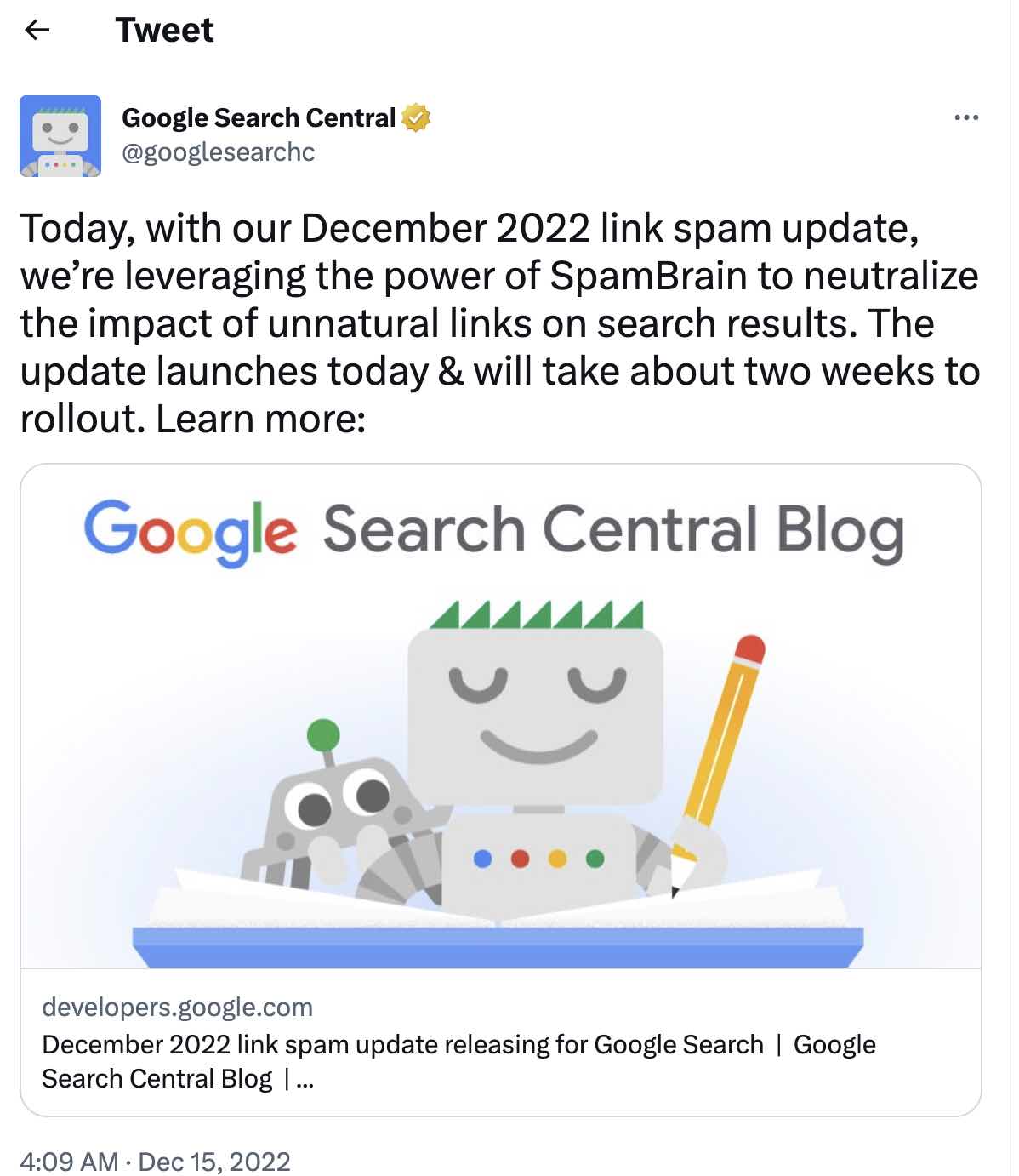I hope you enjoy reading this blog post.
If you want my team to do your SEO & digital marketing for you, click here.
Article Overview
While everyone was preparing for their Christmas holidays, Google has been super-busy with yet another core algorithm update.
On December 14th, 2022, Google announced on Twitter that they would implement a new link spam algorithm.
Great news for those in the SEO game and implement links correctly, and seriously bad news for those SEO agencies trying to spam their way to better rankings.
The latest algorithmic update uses Google’s AI-based spam prevention system, also known as SpamBrain, to negate the impact of inorganic or unnatural (we can even call it spammy) link building on the search results.
Google tells us they can identify spammy link building and void these links as part of your website’s authority. So, if you have been part of any link-building scheme or purchased links from questionable websites or private blog networks, you would have felt the impact of this algorithm rollout.
Google further states that they will be able to detect websites that are buying and selling links, and the effects of those links will no longer contribute towards site authority, search visibility, and rankings.
It’s important to note that Google will not impose a penalty on your website and have it removed from the search results. Instead, you will notice a drop in the rankings due to neutralising the value of the links that previously contributed to your site. In some ways, this is good news as you don’t have to recover from a Google penalty as in the past, which was trickier. Instead, you have to focus on a compliant link-building campaign.
You can see the evidence of this rollout update on Twitter below in their statement, which read:

“Today, with our December 2022 link spam update, we’re leveraging the power of SpamBrain to neutralise the impact of unnatural links on search results. The update launches today & will take about two weeks to roll out.”
Google’s guidance on the December 2022 link spam update and what you need to know:
The Google Search Central Blog was updated with important information explaining the latest algorithm update in Google’s ongoing battle to fight link spam and SEO agencies that continue bad link-building practices (that is, Black-hat SEO).
Here are some of the main points we’ve learnt from this rollout:
- If you have seen a sudden drop in rankings, say from 15 -18 December, then it is likely a direct result of this rollout.
- The algorithm can detect sites that have bought and sold links. This will directly impact sites that are part of private blog networks or PBNs.
- Any ‘unnatural’ link-building activity will be detected and neutralised. If your SEO agency has been building hundreds of links for you per month, this is the time to start worrying, as this algorithm will detect this activity.
- Your website will not disappear from Google as in a penalty or manual action. But it will drop in the SERPs (search results).
- It will take about 14 days to roll out fully.
- Google is constantly using its algorithm and manual actions to fight SEO agencies trying to manipulate the search results; however, this update goes even further and aims to neutralise spammy links before they pass on any ‘link juice’ and push your rankings higher. In other words, any future link building deemed spammy will have zero effect on rankings where previously they did. Previously Google would have slammed a Google penalty on your site for this type of activity, and you would have had to wait weeks or even months before your site was restored. Most businesses that rely on Google for inquiries would have been hurt badly and, in the worst-case scenario, would have had to shut up shop. This rollout is a lifesaver as sites are not penalised and still show up in the search results just a few pages lower. You are at least given the immediate opportunity to help fix the issue.
Nest Steps: if this rollout has affected your website
If you have been impacted by Google’s December 2022 link spam algorithm update, do not panic, as there are some steps to take to help restore rankings and get business back to normal:
- Check your backlink profile in Google Search Console. You will have to go through each link and determine if they are legitimate from trustworthy websites. There are other third-party sites like ahrefs, but it’s best to go directly to the source at Google. If there are inbound links, you will have to get them removed either by contacting the website owners directly (this is a nearly impossible task) or have them ignored by Google by going to the disavow tool. Here is the link: https://support.google.com/webmasters/answer/2648487?hl=en
- Give this a few days. They may bounce back if your rankings have only slipped a few places. But if you destroy a bunch of good links unnecessarily, you may be causing more harm to your site than you need to. Remember, some links are good and should be permanent.
- Have your main competitor dropped in the rankings, or have they climbed? If you like me and watch what your competitors are doing, you’ll soon see if the rollout has impacted them. If not, check their backlink profile, determine the quality of their links, and try to emulate this. Now’s the time to get serious about link building and not use dodgy SEO agencies that promise you dozens of low-quality links per month at bargain basement prices.
- Consult an SEO professional. SEO is difficult for even the best of us. I am constantly trying to figure out what Google is doing; this is a full-time job. Imagine a business owner with little or no idea about Google algorithmic updates – it’s a nightmare. You now have to contact an SEO expert to help you better understand the rollout and its impact on your business. The worst thing you can do is wait for too long, as your rankings WILL NOT improve. Google has neutralised your inbound links, and your new position on Google has been determined, and it’s time to take an active stance and look at improving it. This rollout is a good thing as it will make you take a good long look at your SEO provider and make them now accountable for their past SEO link-building actions!








